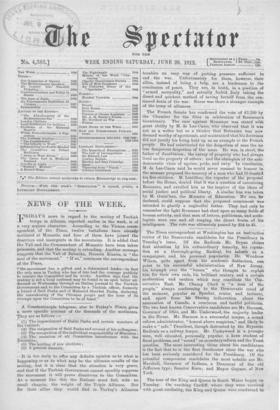The French Senate has confirmed the vote of £1,200 by
the Chamber for the fetes in celebration of Rousseau's bicentenary. The case against Rousseau was stated with great ability by M. de Las-Cases, who observed that it was not as a writer but as a thinker that Rousseau was now deemed worthy of apotheosis, and maintained that his doctrines did not justify his being held up as an example to the French people. He had substituted for the despotism of man the no less dangerous despotism of the mass. He was, in short, the father of Jacobinism ; the enemy of property who had always lived on the property of others ; and the champion of the anti- democratic vices of egoism, pride, and envy. In conclusion, M. de Las-Cases said he would never consent to honour in the manner proposed the memory of 4 man who had ill-treated his five children. M. Lintilliac, the reporter of the proposal before the House, denied that it was a question of canonizing Rousseau, and extolled him as the inspirer of the ideas of social justice and political liberty. A similar line was taken by M. Guist'hau, the Minister of Education. No one, he declared, could suppose that the proposed monument WKS intended to glorify a neglectful father. They had only to remember the light Rousseau had shed upon so many fields of human activity, and that men of letters, politician's, and socio- logists were one and all reaping the direct fruits of his intelligence. The vote was ultimately passed by 234 to 45.






















































 Previous page
Previous page